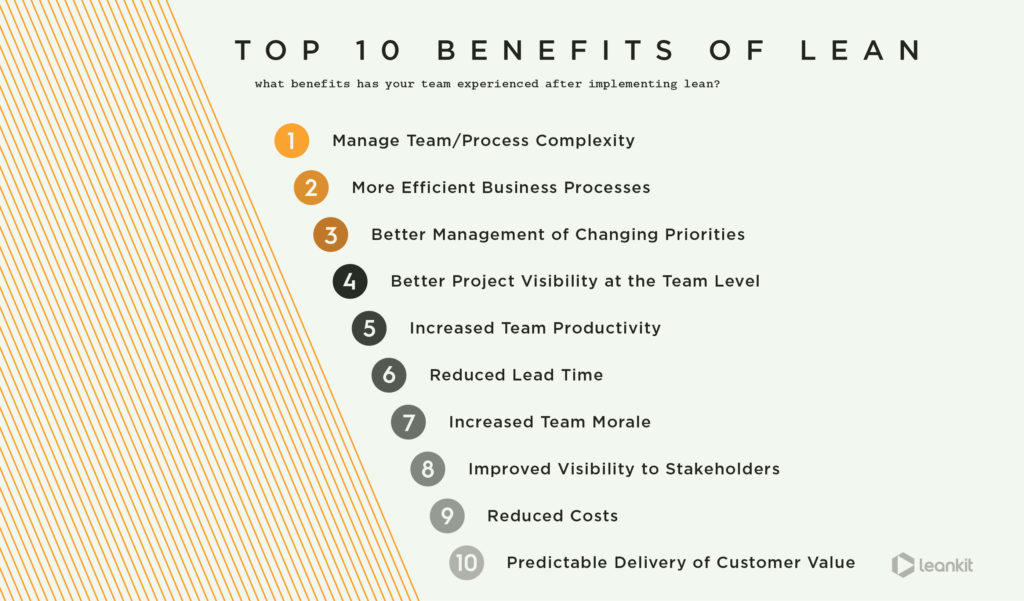The Benefits of Lean: Achieving Efficiency and Excellence
Lean methodology has gained significant recognition in various industries due to its ability to enhance productivity, reduce waste, and drive continuous improvement. In this article, we will explore the numerous benefits of implementing lean principles within organizations, and how it can lead to exceptional outcomes.
Increased Efficiency
One of the primary advantages of lean is its ability to streamline processes and eliminate non-value-added activities. By identifying and eliminating waste, such as overproduction, unnecessary transportation, and excess inventory, organizations can achieve higher efficiency levels. Lean principles emphasize the importance of optimizing workflow, reducing cycle times, and enhancing overall operational performance.
Enhanced Quality
Lean methodology places a strong emphasis on quality improvement. By implementing lean techniques, organizations can identify and address quality issues at their root causes, ensuring that defects are minimized and customer satisfaction is maximized. Through continuous improvement efforts and the involvement of all employees, lean enables organizations to deliver products and services that meet or exceed customer expectations.
Cost Savings
Implementing lean principles can lead to significant cost savings for organizations. By eliminating waste and improving efficiency, companies can reduce their operational costs, including labor, materials, and overhead expenses. Lean also helps organizations optimize their supply chain, resulting in reduced lead times, better inventory management, and lower transportation costs. These cost savings can directly contribute to improved profitability and a competitive edge in the market.
Employee Engagement and Empowerment
Lean methodology promotes a culture of employee engagement and empowerment. By involving employees in process improvement initiatives, organizations create a sense of ownership and accountability among their workforce. Employees become actively engaged in identifying and implementing improvements, leading to increased job satisfaction and motivation. This collaborative approach fosters a culture of continuous learning and innovation within the organization.
Improved Customer Satisfaction
Lean principles are closely aligned with customer-centricity. By eliminating waste and focusing on value-added activities, organizations can enhance the overall customer experience. Shorter lead times, improved product quality, and efficient service delivery contribute to higher levels of customer satisfaction. Satisfied customers are more likely to become loyal advocates for the organization, leading to increased customer retention and positive word-of-mouth referrals.
Flexibility and Adaptability
Lean methodology enables organizations to be more flexible and adaptable to changing market dynamics. By fostering a culture of continuous improvement, organizations can quickly respond to customer demands, market trends, and competitive pressures. Lean principles encourage organizations to embrace change, seek innovative solutions, and continuously evolve their processes and products to stay ahead in a dynamic business environment.

In conclusion, implementing lean principles within organizations offers a multitude of benefits, ranging from increased efficiency and enhanced quality to cost savings and improved customer satisfaction. By embracing lean methodology, organizations can achieve excellence in their operations, drive continuous improvement, and gain a competitive edge in the market. Businesses must recognize the potential of lean and leverage its principles to unlock their full potential.
Frequently Asked Questions
1. What is Lean?
Lean is a systematic approach to streamlining processes and eliminating waste in order to increase efficiency and overall performance.
2. What are the key benefits of implementing Lean?
The key benefits of implementing Lean include improved productivity, reduced costs, enhanced quality, increased customer satisfaction, and improved employee morale.
3. How does Lean help in reducing costs?
Lean helps in reducing costs by identifying and eliminating non-value-added activities, minimizing inventory, optimizing resource utilization, and improving process flow.
4. Can Lean improve the quality of products or services?
Yes, Lean can significantly improve quality by focusing on error prevention, standardizing processes, implementing quality control measures, and continuously monitoring performance.
5. How does Lean enhance customer satisfaction?
Lean improves customer satisfaction by delivering products or services faster, with fewer defects, and meeting customer expectations more consistently.
6. Does Lean benefit only manufacturing industries?
No, Lean principles can be applied to any industry or sector, including service-oriented businesses, healthcare, government organizations, and even non-profit organizations.
7. How does Lean contribute to employee morale?
Lean involves empowering employees, promoting teamwork, providing opportunities for skill development, and involving them in problem-solving, which leads to increased job satisfaction and higher morale.
8. Can Lean help in reducing lead times?
Yes, Lean methodologies such as value stream mapping, just-in-time production, and continuous flow can significantly reduce lead times by eliminating bottlenecks and reducing waiting times.
9. Are there any risks or challenges associated with implementing Lean?
While implementing Lean can bring numerous benefits, some challenges may include resistance to change, lack of employee buy-in, and the need for ongoing commitment and continuous improvement.
10. How can an organization start implementing Lean?
An organization can start implementing Lean by conducting a thorough assessment of current processes, identifying areas for improvement, creating a plan, providing training to employees, and continuously monitoring and adjusting the implementation.




